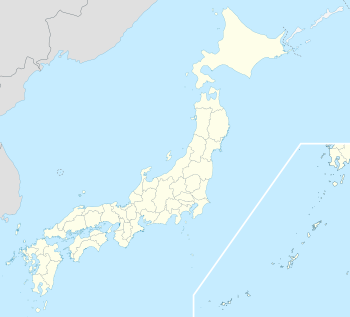Japan Railways Group
Group of companies that replaced Japanese National Railways From Wikipedia, the free encyclopedia
The Japan Railways Group, commonly known as the JR Group (Jeiāru Gurūpu) or simply JR, is a network of railway companies in Japan formed after the division and privatization of the government-owned Japanese National Railways (JNR) on April 1, 1987.[1] The group comprises six regional passenger railway companies, one freight railway company, and two non-service entities. The JNR Settlement Corporation assumed much of the debt of the former JNR.


The companies of the JR Group operates a significant portion of Japan’s rail services, including intercity routes, commuter lines, and the Shinkansen high-speed rail network.
JR Hokkaido, JR Shikoku, and JR Freight (JRF) are governed by the Act for the Passenger Railway Companies and Japan Freight Railway Company[2], also known as the JR Companies Act, and are overseen by the public Japan Railway Construction, Transport, and Technology Agency (JRTT). In contrast, JR East, JR Central, JR West, and JR Kyushu are fully privatized and publicly traded.
Due to JR’s origins as a government-run entity, Japanese rail users often distinguish JR lines (including some now operated by third-sector entities) from other private railways. This distinction is typically reflected in the way JR and other private railways are labeled on maps.[3]
Background



By the 1970s, passenger and freight business had declined, and fare increases had failed to keep up with higher labor costs.[4]
The JR Group companies were formed out of the privatization of the Japanese National Railways in 1987.[5][6]
The seven JR companies recorded a total profit of ¥ 88.9 million in 1988.[7]
Ownership
In 1987, the government of Japan took steps to divide and privatize JNR. While division of operations began in April of that year, privatization was not immediate: initially, the government retained ownership of the companies. Privatization of some of the companies began in the early 1990s. By October 2016, all of the shares of JR East, JR Central, JR West and JR Kyushu had been offered to the market and they are now publicly traded. On the other hand, all of the shares of JR Hokkaido, JR Shikoku and JR Freight are still owned by Japan Railway Construction, Transport and Technology Agency, an independent administrative institution of the state.
All the JR Group companies operating in the Honshū region are constituents of the Nikkei 225 and TOPIX 100 indexes.
Companies
Summarize
Perspective
The Japan Railways Group consists of seven operating companies and two other companies that do not provide rail service. The operating companies are organized into six passenger operators and a nationwide freight operator. Unlike some other groups of companies, the JR Group is made up of independent companies, and it does not have group headquarters or a holding company to set the overall business policy.
The six passenger railways of the JR Group are separated by region. Nearly all their services are within the prescribed geographic area. However, some long-distance operations extend beyond the boundaries. The Shirasagi train service between Nagoya and Kanazawa, for instance, uses JR West rolling stock but the segment of track between Nagoya and Maibara is owned by JR Central, whose crew manage the train on that section.
Japan Freight Railway Company operates all freight service on the network previously owned by JNR.
In addition, the group includes two non-operating companies. These are the Railway Technical Research Institute and Railway Information Systems Co., Ltd.
To cover various non-railway business areas, each regional operator in the JR Group has its own group of subsidiary companies with names like "JR East Group" and "JR Shikoku Group".
| Business | Logo and color | Company | Type | Fully privatized | Traded as | Region(s) of operation | Note |
|---|---|---|---|---|---|---|---|
| Passenger | Grass |
Hokkaido Railway Company (JR Hokkaido) | Kabushiki gaisha | — | — | Hokkaidō | Operates Hokkaidō Shinkansen |
Forest |
East Japan Railway Company (JR East) | 2002 |
|
Tōhoku, Kantō, Hokuriku, Kōshin'etsu | Operates Tōhoku, Yamagata, Akita and Jōetsu Shinkansen Lines, along with Hokuriku Shinkansen with JR West | ||
Pumpkin |
Central Japan Railway Company (JR Central) | 2006 | Chūbu | Operates Tōkaidō Shinkansen | |||
Ocean |
West Japan Railway Company (JR West) | 2004 |
|
Hokuriku, Kansai, Chūgoku, Kyūshū | Operates Sanyō Shinkansen and Hokuriku Shinkansen (with JR East) | ||
Sky |
Shikoku Railway Company (JR Shikoku) | — | — | Shikoku | |||
Scarlet |
Kyushu Railway Company (JR Kyushu) | 2016 | Kyūshū | Operates Kyūshū Shinkansen | |||
| Freight | Slate |
Japan Freight Railway Company (JR Freight) | — | — | Nationwide | ||
| IT Services | Burgundy |
Railway Information Systems (JR Systems) | — | — | Nationwide | Develops, operates and manages computer systems, including MARS (ticket reservation system)[8] Jointly owned by the railway operating companies[9] | |
| Research & Development | Lavender |
Railway Technical Research Institute (RTRI) | Public Interest Incorporated Foundation | — | — | Nationwide | Conducts research and development of railway-related technologies, such as SCMaglev[10] Non-profit organization funded by the railway operating companies[10] |
Network
JR maintains a nationwide railway network as well as common ticketing rules that it inherited from JNR. Passengers may travel across several JR companies without changing trains and without purchasing separate tickets. However, trains running across the boundaries of JR companies have been reduced.
JR maintains the same ticketing rules based on the JNR rules and has an integrated reservation system known as MARS (jointly developed with Hitachi). Some types of tickets (passes), such as Japan Rail Pass and Seishun 18 Ticket, are issued as "valid for all JR lines" and accepted by all passenger JR companies.
Unions
Various unions represent workers at the different JR Group companies, such as the National Railway Workers' Union, All Japan Construction, Transport and General Workers' Union, Doro-Chiba, and the Japan Confederation of Railway Workers' Unions.
See also
- Rail transport in Japan
- List of railway companies in Japan
- Japan Railways locomotive numbering and classification
- SoftBank Telecom – former Japan Telecom, an affiliated company of JNR established in 1984
References
External links
Wikiwand - on
Seamless Wikipedia browsing. On steroids.

